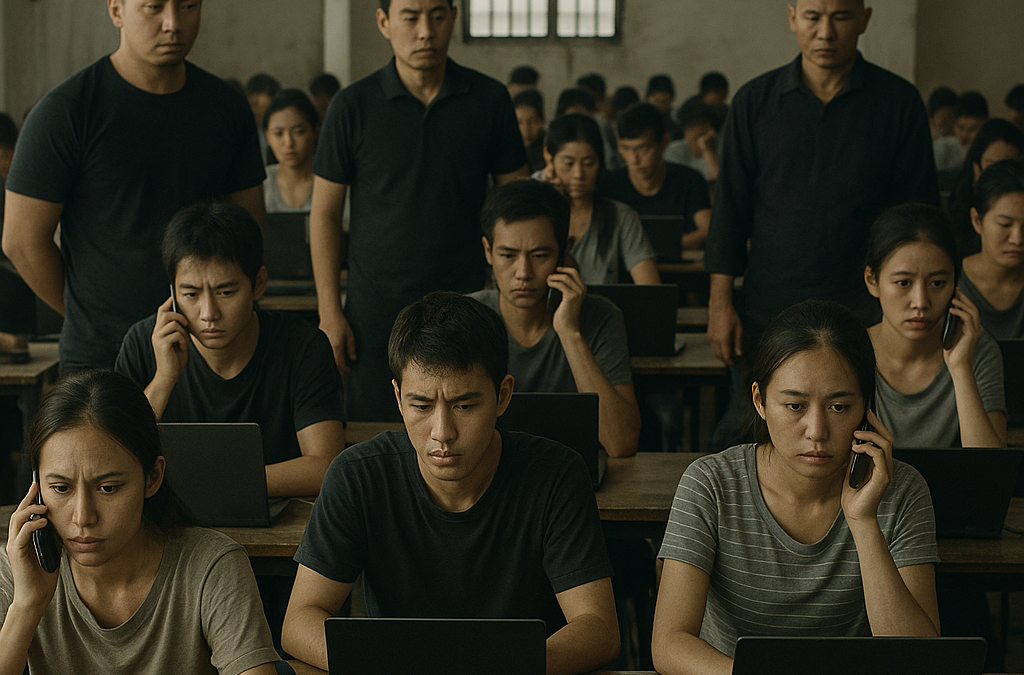Forced to Scam: The Hidden Slavery Behind Online Fraud
In a dark and rising form of modern slavery, tens of thousands of people across Southeast Asia are being trafficked, imprisoned, and forced to scam unsuspecting victims, like us, online.
This isn’t a Hollywood cyber-thriller; it’s real. And it’s happening right now in countries like Myanmar, Cambodia, and Laos. As a result, these so-called “scam centres” are not just criminal enterprises defrauding global victims; they are also sites of forced labour, torture, and human trafficking.
What Is Forced Scamming?
Traffickers prey on people, often young adults. Most are from countries like Indonesia, Vietnam, the Philippines, Thailand, and even China. Always promising them high-paying tech jobs abroad. Many respond to ads on social media or recruitment platforms that seem legitimate.
When they arrive, their documents are confiscated. In addition, they’re locked inside guarded compounds, surrounded by barbed wire, with no way out. Furthermore, they are forced to work 18-hour days operating elaborate online scams. These include: romance frauds, fake crypto investments, business impersonation and phishing scams.
Non-compliance isn’t an option. Specifically, survivors report beatings, torture, starvation, electric shocks and even death threats. For example, in one compound in Myanmar’s Myawaddy region, survivors reported being sold between scam gangs like cattle if they didn’t meet scam quotas!
This is not just trafficking, it’s slavery.
And it’s powering a billion-dollar scam industry targeting Australians and others around the world.
Australia’s Connection: Victims on Both Ends
Australia is directly affected by this growing crisis in two critical ways.
Firstly, we are a major target. Australians reported over $480 million lost to scams in 2023 (that would be nice back in our economy!), according to the ACCC’s Scamwatch. Many of these scams are operated by trafficked workers trapped in scam compounds.
Secondly, Australians are among those being recruited or duped into becoming workers themselves. Further, IJM Australia reports that Australians have responded to job ads for digital marketing roles in Asia, only to find themselves held in scam compounds abroad.
This means we are both the victims of scams and, tragically, the destination for forced labour’s criminal output.
International Attention and Urgent Action
Organisations like the UNODC, IJM Australia, and The Mekong Club are calling these scam centres a form of economic terrorism. With an estimated 120,000 people trapped in Myanmar alone, and similar numbers in Cambodia and Laos, this is now one of the most widespread forms of modern slavery in the region.
These centres are often backed by transnational organised crime syndicates and operate with impunity in conflict zones or corrupt jurisdictions. Despite growing pressure, enforcement is slow and inconsistent. That’s why regional collaboration, between ASEAN, Australia, and human rights NGOs, is urgently needed to dismantle these networks and rescue the victims.
A Scam – What Can We Do?
Although this is a complex international crisis, each of us can take action to reduce harm and raise awareness:
1. Recognise the Red Flags of Online Scams
Stay alert to scam tactics and report anything suspicious via Scamwatch. Common scams include:
-
Romance approaches via social media
-
“Investment” opportunities in crypto or stocks
-
Tech support requests or hacked account messages
Behind these screens could be someone enslaved and forced to deceive.
2. Pause and Protect Others
If you’ve been scammed, it’s not your fault. But by reporting the scam to authorities and warning your networks, you help prevent others falling victim—and reduce demand for this exploitative labour.
3. Share Survivor Stories
Organisations like IJM Australia are working with survivors of forced scamming. Read and share their stories to raise awareness and change the narrative—from “tech fraud” to human slavery.
4. Support Survivor-Led Justice
Here at The Freedom Hub, we work every day with survivors of slavery in Australia, helping them rebuild their lives. When you support our work, you’re creating systemic change—from ethical procurement to survivor-led policy advocacy.
Final Word: Hope in Action
Forced scamming is a 21st-century slavery crisis. It is digital, global, and devastating. But change is possible.
By staying vigilant, informed and vocal, Australians can protect themselves from online fraud while also standing up for those trapped behind the scam.
The next time you receive a suspicious message, don’t just delete it.
Ask: Who might be forced to send this? And how can I help end the system behind it? Then contact Scamwatch.
If we all do this, we can help break the cycle of exploitation.
The Freedom Hub does not work directly with survivors of scamming, but part of our mission is to ‘partner in the fight to end global slavery’. As a result, we raise awareness and offer NGO connections to businesses that want to work in countries that have a high risk of slavery. You can contact us to find out more at: [email protected]

